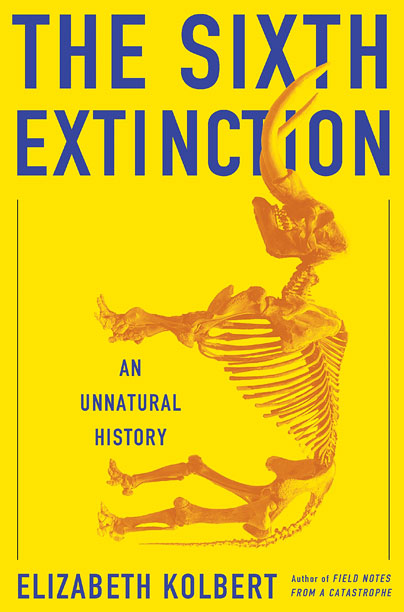I so looked forward to reading Elizabeth Kolbert’s The Sixth Extinction. But in the end, I sat feeling like there was a “big elephant in the room,” as the saying goes – in this case, it would be elephant in the pages….Kathyrn Schultz’s review on vulture.com articulately picks up these feelings.
Schultz writes:
…she makes a page-turner out of even the most sober and scientifically demanding aspects of extinction. Combining a lucid, steady, understated style with some enviable reporting adventures (chasing frogs in the Panamanian jungle, watching coral spawn in the Great Barrier Reef), she produces a book that is both serious-minded and invites exclamation points into its margins. You will finish The Sixth Extinction knowing a lot about the history and ecology of mass die-offs. You will also know that the Bikini Atoll once went by the less wearable name of Eschscholtz; that certain frogs “survive the winter frozen solid, like popsicles”; and that, if you were a dinosaur in Canada when that asteroid hit the Yucatán, you had approximately two minutes to live.
Those facts—not just the fun ones, the sum total—supply the substance but also the tenor of this book. For a work of what we might term mid-apocalyptic nonfiction, The Sixth Extinction is remarkably restrained. Unlike in her last book, Field Notes From a Catastrophe, Kolbert does not embroil herself here in the politics of environmental disaster. Instead, she exposes its ecological mechanisms, and, in what must be among the most studiously neutral sentences ever written, expresses the hope that readers “will come away with an appreciation of the truly extraordinary moment in which we live.” By which she means, of course, the truly extraordinary moment in which so much around us begins to die.
You will learn a lot about key species extinctions, and a lot about the history of how society began tracking extinctions. However, coming away with an “appreciation” of the “truly extraordinary moment in which we live”? These words just don’t seem like the right words. I would say instead words like coming away with a “wake up” to a “crisis” moment. I kept reading waiting for talk of the heart of what is causing this extinction we are now in – yes now – and like Schultz was a bit surprised where Kolbert did not go:
Kolbert tells all this like it is, and like it almost certainly will be. But she declines to tell us how to feel about it or what to do. Virtually the entirety of what this book has to say about feeling and doing shows up in two lines three pages from the end, after we understand exactly how depauperate we have rendered our planet. “It doesn’t matter much whether people care or don’t care,” Kolbert writes. “What matters is that people change the world.” The first sentence stings. The second unsettles; she must surely have chosen its undertones. ‘Change the world’ is our stock summons to positive action. It hangs in these final pages unresolved, stuck between its major and her minor key.
In reading this I was left thinking – if people don’t care, how will change ever occur? As much as I wish it was, I can see how Kolbert did not intend her book be about inspiring action. At the very least I expected the use of the word “overpopulation” here and there to suggest a root cause. But at least my kindle word search did not find this word in the entire 300+ page book.
Population experts I know will lament this. More and more experts believe that we’re past the synonymous use of population growth and overpopulation, and that speaking to “population growth” is actually “passe.” Why? Because we are already at a crisis point when in it comes to overpopulation. Many don’t want to believe it, but it is true. Amidst a lot of interesting extinction information, in this book there is one big elephant called overpopulation that is linked to this extinction – this one with humans at the center of it.
There needs to be more straight up talk about the overpopulation crisis. And that is just what renowned conservationist Dave Foreman and I did with the 2nd edition of the book, Man Swarm: How Overpopulation is Killing the Wild World…


Based on your description, it seems really odd that someone coming from the field of biology or zoology would not mention population at all. Maybe from an evolutionary biology point of view, Homo sapiens is not in danger of becoming totally extinct, “just” suffering a massive die-off. So, hey, no big deal, mass extinctions happen, get use to it, etc.
Or, from a slanted Darwinian standpoint, having large numbers is a mark of success of a species, so overcrowding is just a temporary condition.
I am one of those weird childfree outliers who thinks the “overpopulation” reason for childfreedom is a little overblown sometimes. Franky, I don’t care if my not having children is good for the planet or bad for the planet. I chose it for my own reasons. If having kids would help improve the environment, I still wouldn’t have them.
I have to say overpopulation issues did not drive my decision in the beginning. But as I have followed environmental issues and now learning even more as a result of a book project I am involved in, I see that reducing population is critical at this juncture. Pronatalist bias about how “bio is best” with kids not serve those already on the planet. If one wants to raise children, there are Many children who need loving homes. But adoption is seen as such as the last resort too often. I am still stunned that a thick book on extinction did even use the word overpopulation or population growth for that matter….